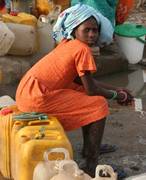Wealth versus greed: churches bring concern over the ethics of economic growth to a consultation in Tanzania

Poor people, like this internally displaced young woman in Chad, are hardest hit by environmental problems such as the lack of clean water.
Photo: ACT International
When does the pursuit of economical wellbeing turn into greed? This is one of the questions to be discussed at a 5-9 November ecumenical consultation in Dar es Salaam. Joint church strategies and actions for addressing the interlinked problems of poverty, excessive wealth, and ecological degradation in Africa are intended results.
The consultation is a continuation of a process which was started at the WCC 8th assembly in Harare in 1998 and became known as Alternative Globalization Addressing People and Earth (AGAPE) since the 9th assembly in Porto Alegre. Ten years later, the issue of socio-economic justice is no less pressing. Especially in Africa, the gap between the rich and the poor has widened, with destructive consequences for peace and for the environment.
Discussions in Dar es Salaam will help to draw a "greed line" as practical guidance to Christians regarding sources of growth - such as speculation or expropriation - and the level or ratio of wealth accumulation that are unethical. The theological methodology will emphasize African concepts like "Ubuntu" as well as the theology of peace in the market.
Similar church encounters are to take place on four other continents before the next WCC assembly. Recognizing that there can be no peace without justice, these encounters also inform the International Ecumenical Peace Convocation which will conclude the Decade to Overcome Violence in 2011.
Theologians, women and youth participants will inform the consultation with their experiences working on the issue of poverty, wealth and ecology at three preparatory hearings on 5-6 November. More stakeholders representing the diversity of Africa and the rest of the world will join the consultation subsequently, bringing it to a total of fifty participants.
More information on the WCC and Poverty, wealth and ecology



